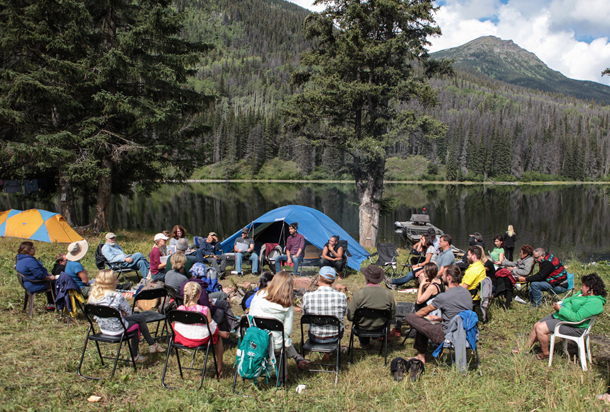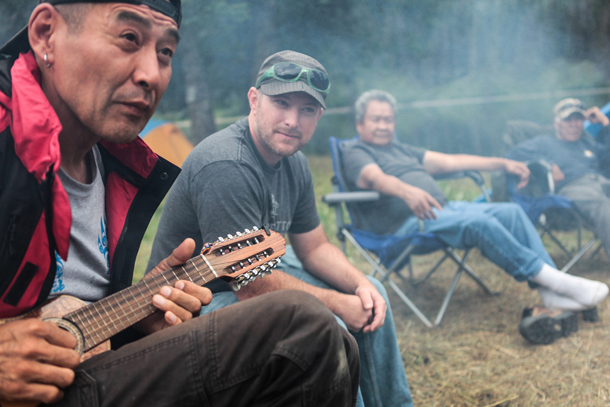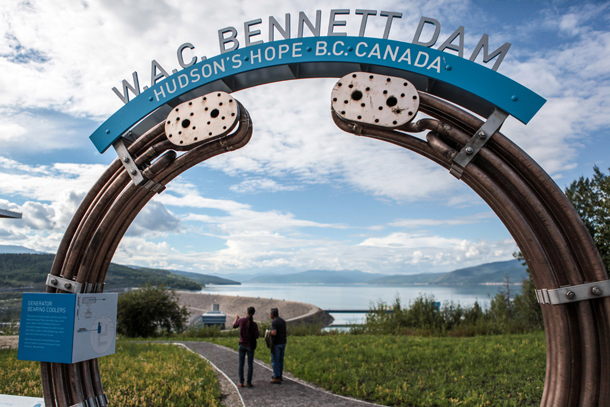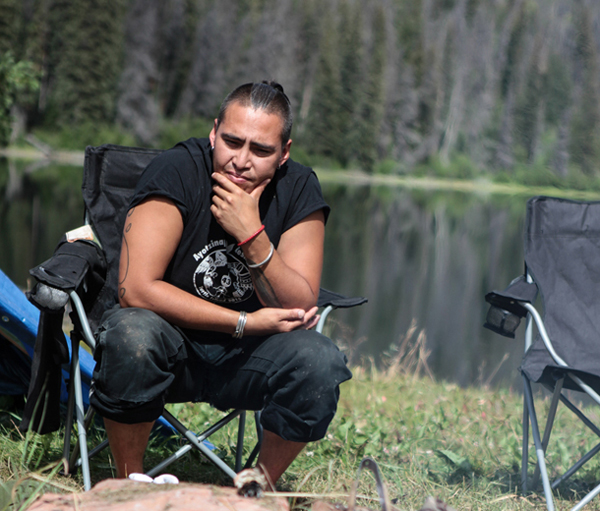''Lawyer by training, shitshow by life.''
Caleb Behn introduces himself a little apologetically, shoving aside boxes of bullets and books so I can squeeze into the front seat of his gunmetal-grey Tacoma. The back seat is a tangle of rifles, clothes and more books. On the dashboard, a Yoda figure sagely nods its plastic green head.
It's August, and we're heading west to Carbon Lake from Fort St. John, ''land of big boys and big trucks,'' Behn says. He qualifies on both counts. The 33-year-old Eh-Cho Dene and Dunne-Za lawyer and activist is best known as the star of the documentary Fractured Land.
The critically acclaimed film portrays Behn as a young, ambitious First Nations leader attempting to bridge worlds and, in the process, challenge big oil. He studies colonial law with decolonizing intent. He sports a mohawk and a business suit. His mom is an oil and gas consultant, his dad a loud opponent of industry.
Behn, like everyone, contains multitudes, but rarely are they so bold, so oppositional, so compellingly exposed on a big screen.
Fractured Land, perhaps dangerously, portrays the young lawyer as a solitary saviour, an indigenous David battling the Goliath of development in northeastern B.C., where the fracking revolution has brought oil and gas development on a scale rarely seen in Canada.
Behn rejects the lone hero narrative. He can't fight these battles alone, he says. Especially as his goal is a bigger victory than stopping fracking projects or even halting the B.C. government's $9-billion Site C dam on the Peace River.
Fractured Land made Behn semi-famous. And fame is a weapon he hopes to use to end a colonial approach to resource management that leaves First Nations communities with no real control over decisions about their land and, especially, their water.
That's why we're cruising through rolling green hills and skeletal stands of beetle-killed pine on the 130-kilometre road west to Carbon Lake.
Behn's new celebrity brought connections, including Karen Bakker, a distinguished water scholar at the University of British Columbia. They're applying for a seven-year Partnership Grant from the Social Science and Humanities Research Council of Canada.
Behn says the money could be used to ''implode resource management as we know it'' in western Canada. Not to undermine industry, he says. But to force it to operate fairly, in ways that don't threaten watersheds and First Nations communities.
So where to begin? On the land, naturally, with a four-day backwoods brainstorming session to help formulate the grant proposal.
The idea behind ''Water Bush Camp,'' as Behn and Bakker dubbed the gathering, was simple. Recruit experts in the law, hydrology, political sciences, traditional knowledge, resource management and the arts. Take the 40 scientists, artists, lawyers, academics, First Nations elders, activists -- and a writer -- into the woods of northeastern B.C. Show them the rivers, the dams, the industrial damage. Pitch tents on the still-pristine shores of Carbon Lake, ''a tangible piece of anchorage in the storm of development,'' as Behn described it. Let the ideas for change flow.
Behn steers his truck into the Peace River valley. This is where the Site C dam, if it gets built despite opposition and pending lawsuits, will flood First Nations' territory and farmland in an area twice the size of Vancouver.
''Keep the Peace,'' implores a roadside billboard. ''Site C Sucks'' declares another, which also advertises, with a hint of desperation, ''Feed Oats + Barley for Sale.''
Closer to Carbon Lake, Behn drives down logging roads with a rifle in his lap, ''just in case we spot a moose.'' Even without a weapon on his knees, Behn gives off a streetwise warrior vibe, an impression he energetically cultivates. He talks about the need to ''drop truth bombs.'' He just signed a book deal with HarperCollins, and while the publisher is calling it a memoir, Behn insists it will be ''a manifesto.''
When we finally arrive at Water Bush Camp, he shows off his dog Mekwan's newest trick: collapsing lifelessly when Behn points his fingers like a gun and yells ''die for the revolution!''
'A critical shift'
It's dusk. We've pitched our tents, introduced ourselves, and settled into bush life at Carbon Lake, where the only noises are the spit and hiss of burning pine and the sound of fish slapping the water. Smoke wafts into my face, then meditatively drifts into someone else's in a democracy of minor discomfort.

On and off screen, Behn is a character. So when he drops the slang and swagger to reveal a deep sincerity, the transformation is almost disarming. I sense Behn gets a kick out of crossing boundaries, unsettling people into seeing him afresh.
''There hasn't been a collective created like this before, not in Canada,'' Behn tells us. ''And the whole thing is designed to cause change.'' He has a low, rumbly voice befitting someone capable of throwing sharp objects with deadly accuracy, whether hatchets at a tree or arguments at the law.
''We brought you all here because we think you can be part of a massive shift,'' he says. ''A critical shift, at a critical time. And we believe you're the right ones to help us move this forward.''
I try to gauge the reactions of other campers to Behn's speech, which strikes me as a bit grandiose but genuine at its heart. Earnest, even. My fellow campers' faces are unreadable in the flickering glow of the fire.
''The thing about change,'' Behn continues, ''is that it's not simple, it's not easy, and it happens way outside comfort zones. As a result, we're anticipating fairly serious opposition if we're effective. I'm kind of terrified by the implications of what we've built here already. So if I seem antsy or too heavily armed or whatever,'' he half jokes, fingering the knife hanging from his belt, ''that’s why.''
Not your typical conference
Water Bush Camp is not your typical academic conference. No power suits or Powerpoint. No nametags or Internet access. Instead of coffee breaks, we have community-building games and water blessing ceremonies. Every organic meal begins with a prayer by a tiny First Nations elder named Nancy (she asked that her last name be withheld), whose fitted tweed jacket and Audrey Hepburn sunglasses are at once glamorous and grandmotherly.
''All I ask for is one thing: Save our water,'' she implores the gathering. ''If you had to save a cup of water for your grandson, you would do it.''
Easier said than done, at least for indigenous people in B.C. Water in the province has been managed through a ''first in time, first in right'' approach, or FITFIR in legal jargon. The first one to register a water license has the right to take the full allocation, and later registrants get what is left. But, says Linda Nowlan, an environmental lawyer, ''the original people on this land were not allowed to take out water licenses. In fact, they were forbidden from doing so.''
How to change this? Behn and Bakker hope Water Bush Camp will generate ideas for the grant proposal, due this fall, and beyond.
''If this seven-year project were to be funded,'' Bakker asks the group, ''what would you like to see endure? What legacy do we want? We're after systemic regulatory governance change.''

Everybody has ideas. An annual Water Bush Camp. Community-led water monitoring. A regional environmental data information system run by and for First Nations. A Truth and Reconciliation Commission for the W.A.C. Bennett Dam.
Built in the early 1960s, the dam created Williston Lake, the largest man-made body of water in B.C., twice the size of Manning Provincial Park. Although the province relocated Peace Valley farmers in advance of the flooding, some local First Nations were not warned about the hydropower project. Some only learned about the dam as the floodwaters began rising.
The B.C. government has tried to reconcile these wrongs through multimillion-dollar settlements with affected First Nations, but trust and forgiveness aren't so easily bought. Maybe a Truth and Reconciliation Commission for the dam could help.
In many ways, the government can't afford not to mend relationships moving forward, particularly as it prepares to build yet another contentious dam on the Peace River. Part of Behn's goal with Water Bush Camp, and the larger SSHRC grant, is to ''ensure the last prophecies of my Dunne-Za and Eh-Cho Dene ancestors don't come true,'' he wrote in an email before the gathering at Carbon Lake.
''Because what was prophesied in this territory on both sides of my family,'' he wrote, ''is the last great war fought by mankind. It will be over water.''
Field trip
We crawl out of our sleeping bags the next morning and head off to see the dam for ourselves. The tour starts with a 50-year-old documentary film made by BC Hydro. The narrator reads the words in the deep, rich timbre of white male authority, equal parts reasonable and righteous. The kind of voice that speaks in capital letters, capable of declaring, without irony, that the W.A.C. Bennett Dam -- with its legacy of environmental destruction and human displacement -- is a ''Canyon of Destiny.''
We watch grainy black-and-white footage of men taking measurements, razing forests, and pouring concrete. The film ends with the narrator dedicating the dam ''to the service of the people of British Columbia.''
He doesn't mention that the dam flooded First Nation villages and opened the door to resource extraction that made it almost impossible to live traditionally on their industrially beleaguered homeland.

We put on yellow safety vests and orange hardhats and take a bus to the dam. Its hollow core is cathedral-like except for the unholy roar of the turbines. Stepping outside again, the sudden quiet is as deafening as the noise. A few eagles monitor the dam's foaming outlets, where trout make easy meals after being churned through ''fish-friendly'' turbines.
''They're a little dizzy when they come out,'' admits our guide.
Judging by the faces of Water Bush Campers, they feel much the same.
Targeting the 'monolith'
Behn drives me back to Fort St. John to catch my flight. With Yoda nodding on the dashboard, he shares a story.
''One day,'' he said, lowering his voice and pausing for effect, ''my grandpa and I were out hunting and we saw a young buck racing toward the dam. He just ran and ran, we weren't chasing him or anything, then he committed suicide over the spillway.''
Maybe the buck was just spooked. Or maybe he guessed, not wrongly, that he had few places left to go.
Behn points out a coal mine, a wind farm, bald logging cutblocks and two natural gas pipelines -- all on a single mountain slope. Coal tenures involve one application process, fracking another. No one looks at the cumulative impacts.
It all sometimes brings Behn to despair. ''I was trained physically and academically to be a destroyer,'' he said. ''Trained to engage, find weak points, crack them open, to target the monolith that is the extractive industrial complex.''
But the training, he said, came at a cost. ''The motif, the spirit, that comes from using those tools was and is killing me. It's destroying me.''
The grant, he said, is about creating something. ''If we're going to implode resource management as we know it, we need a viable alternate structure, an environmental management information system tied to a decolonizing regime.''
Behn and Bakker and their partners won't know if they've won the funding until next spring. With or without the grant, Behn is committed to the cause. Instead of joining some big Vancouver law firm, he became the executive director of Keepers of the Water, a non-profit focused on watershed stewardship and advocacy throughout the Arctic drainage basin. He also moved home to accept a job with the West Moberly First Nation, his mother's band, and one of only two First Nations still contesting Site C in the courts.
For Behn, this work is an offering and commitment to a place he holds sacred. His spiritual side doesn't get much screen-time in Fractured Land, which showed him at law school but didn't show the four-day fast he took on Battleship Mountain above Carbon Lake ''to purify myself after my articles.''
Behn says he is grateful for the doors the film has opened. ''I have a deep debt there... Maybe some change will come of it.''
But he's not waiting around to find out. Behn's making it happen. And as the first Water Bush Camp comes to a close, the bigger story has just begun. ![]()
Read more: Indigenous, Energy, Rights + Justice, BC Politics, Environment















Tyee Commenting Guidelines
Comments that violate guidelines risk being deleted, and violations may result in a temporary or permanent user ban. Maintain the spirit of good conversation to stay in the discussion.
*Please note The Tyee is not a forum for spreading misinformation about COVID-19, denying its existence or minimizing its risk to public health.
Do:
Do not: